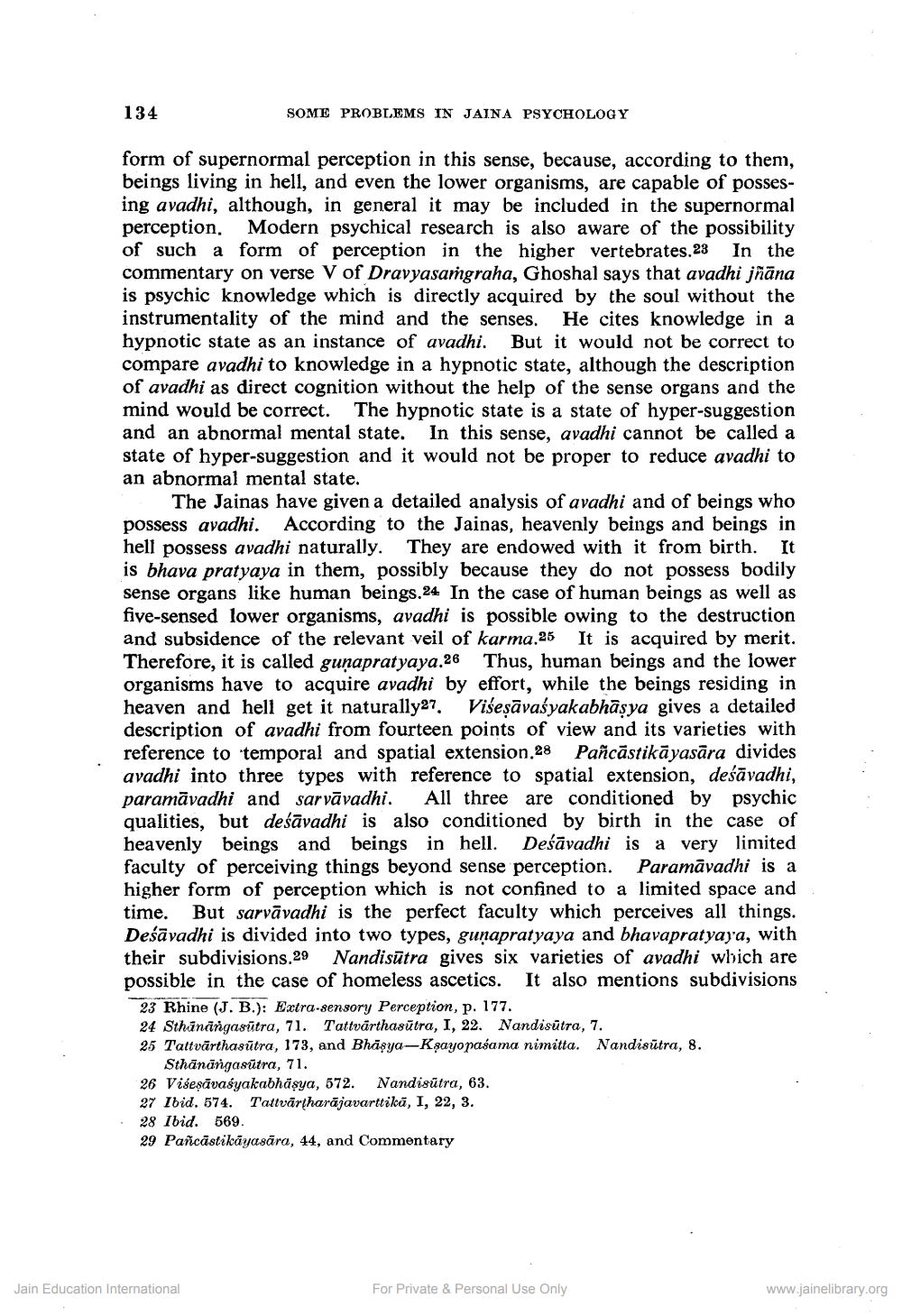________________
134
SOME PROBLEMS IN JAINA PSYCHOLOGY
form of supernormal perception in this sense, because, according to them, beings living in hell, and even the lower organisms, are capable of possesing avadhi, although, in general it may be included in the supernormal perception. Modern psychical research is also aware of the possibility of such a form of perception in the higher vertebrates.23 In the commentary on verse V of Dravyasamgraha, Ghoshal says that avadhi jñāna is psychic knowledge which is directly acquired by the soul without the instrumentality of the mind and the senses. He cites knowledge in a hypnotic state as an instance of avadhi. But it would not be correct to compare avadhi to knowledge in a hypnotic state, although the description of avadhi as direct cognition without the help of the sense organs and the mind would be correct. The hypnotic state is a state of hyper-suggestion and an abnormal mental state. In this sense, avadhi cannot be called a state of hyper-suggestion and it would not be proper to reduce avadhi to an abnormal mental state.
The Jainas have given a detailed analysis of avadhi and of beings who possess avadhi. According to the Jainas, heavenly beings and beings in hell possess avadhi naturally. They are endowed with it from birth. It is bhava pratyaya in them, possibly because they do not possess bodily sense organs like human beings.24 In the case of human beings as well as five-sensed lower organisms, avadhi is possible owing to the destruction and subsidence of the relevant veil of karma.25 It is acquired by merit. Therefore, it is called guṇapratyaya.26 Thus, human beings and the lower organisms have to acquire avadhi by effort, while the beings residing in heaven and hell get it naturally27. Viseṣāvasyakabhāṣya gives a detailed description of avadhi from fourteen points of view and its varieties with reference to temporal and spatial extension.28 Pañcāstikāyasāra divides avadhi into three types with reference to spatial extension, desavadhi, paramāvadhi and sarvavadhi. All three are conditioned by psychic qualities, but deśavadhi is also conditioned by birth in the case of heavenly beings and beings in hell. Deśavadhi is a very limited faculty of perceiving things beyond sense perception. Paramavadhi is a higher form of perception which is not confined to a limited space and time. But sarvavadhi is the perfect faculty which perceives all things. Deśāvadhi is divided into two types, guṇapratyaya and bhavapratyaya, with their subdivisions.29 Nandisutra gives six varieties of avadhi which are possible in the case of homeless ascetics. It also mentions subdivisions
23 Rhine (J. B.): Extra-sensory Perception, p. 177.
24 Sthänängasutra, 71. Tattvärthasutra, I, 22. Nandisutra, 7.
25 Tattvarthasutra, 173, and Bhāṣya-Kṣayopasama nimitta. Nandisutra, 8. Sthänängasutra, 71.
26 Viseṣāvasyakabhāṣya, 572. Nandisutra, 63.
27 Ibid. 574. Tattvārtharajavarttikā, I, 22, 3.
28 Ibid. 569.
29 Pañcāstikāyasara, 44, and Commentary
Jain Education International
For Private & Personal Use Only
www.jainelibrary.org




